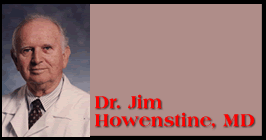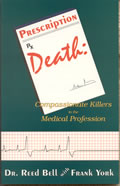Other
Howenstine Articles:
Use of CoQ10
to Treat Malignancies
Why You Should Avoid Taking Vaccines
THE USE OF NATURAL THERAPIES FOR HYPERTENSION
By Dr. James
Howenstine, MD.
February 16, 2004
NewsWithViews.com
What Causes High Blood Pressure?
There is a lot of experimental and clinical evidence that high blood pressure originates in the kidney.. Animals experiments have shown that narrowing an artery to a kidney can produce high blood pressure and correction of this artery blockage permits the blood pressure to return to normal.. Humans born with or developing a narrowing of an artery to a kidney often develop high blood pressure and correcting this artery narrowing surgically frequently returns the blood pressure to normal.
Conventional therapy for hypertension involves the use of pharmaceutical drugs all of which have side effects which may occasionally be incapacitating. A recent admission by Dr. Allen Roses, vice-president of genetics for Glaxo Smith Kline, that "The vast majority of drugs - more than 90 % - only work in 30 to 50 % of the people." confirms what patients and physicians have learned about hypertension.. Treating hypertension with drugs is a hit or mass proposition with frequent drug changes being a prerequisite for proper blood pressure control. Dr. Roses is currently working to develop methods to screen patients with genetic tests that will discover which drug is most likely to work in an individual patient.
Are There Natural Treatments That Work In Hypertension?
Fortunately there are many worthwhile substances that work, are safe, and are often less expensive than pharmaceutical drugs. One of the cornerstones of natural therapy for hypertension is magnesium, which can be given as oxide, aspartate, or a mixture of both. Magnesium relaxes the musculature in the walls of the arteries, permitting the artery to widen and the blood within the artery then exerts less pressure against the wall of the artery (Vasodilatation). This results in lower blood pressure until the effect of the magnesium wears off.
Because the action of magnesium is a physiologic effect of the magnesium ion on arterioles it will work for all persons. Some pharmaceutical drugs used in treatment of hypertension vary in effectiveness depending on age, sex, Afro-American, Oriental, and other subgroups ie. Afro-Americans often respond better to diuretic therapy than Caucasians.
The magnesium ion also acts as a stimulant to the gastrointestinal tract, which means that high magnesium doses may be associated with frequent bowel movements.
This action of magnesium in the body as a vasodilator has long been successfully used in obstetrics to lower the blood pressure in eclampsia.
Intravenous magnesium given during a heart attack improves the survival rate, probably by preventing extra ventricular heartbeats, which can lead to dangerous heart rhythms.
The maintenance dose for blood pressure control needs to be 1000 mg. or more daily. Most individuals in the United States have a dietary deficiency of magnesium so this therapy is a rational approach .Magnesium oxide and aspartate can be found in health food stores.
CoQ 10 For Hypertension
CoQ 10 is a essential nutrient which promotes longevity that is found in every cell of the body. This nutrient increases the energy output by the mitochondria of the cell so it is easy to understand why this substance could benefit many diverse medical conditions. Interest in the use of CoQ 10 for a wide variety of medical disorders was stimulated by the brilliant biochemist Dr. Karl Folkers. He first persuaded cardiologist Dr. Langsjoen at the Medical School of the University of Texas to try CoQ 10 for heart failure. Later Dr. Langsjoen stated that "The clinical experience with CoQ 10 in heart failure is nothing short of dramatic. It is reasonable to believe that the entire field of medicine should be re-evaluated in light of this growing knowledge".
One of the benefits of CoQ 10 is significant lowering of the blood pressure. The daily doses needed varied between 180 mg. and 360 mg daily..
Coenzyme Q10 was given to 109 cardiology patients who had hypertension for at least one year. They were given an average dose of 225 mg. daily. Blood tests were taken to insure that the blood level of Co q10 was over 2.0 mcg/ml.
Fifty one per cent of these patients were able to discontinue between one and three of their usual blood pressure medicines by four and one half months into the study. The thickness of the heart muscle in the left side of the heart was found to exhibit a beneficial decrease and the main chamber of the heart (left ventricle) showed improved function in the 9.4% of patients who had an echocardiogram before and after the study.
Be sure your blood pressure is being monitored regularly, as only 90 % of patients respond to Co Q10. If there is no benefit in two months the therapy should be changed.
CoQ 10 has also been found useful in improving kidney function in patients with uremia, resolving inflammatory conditions in heart muscle (myocarditis and Idiopathic Dilated Cardiomyopathy which has recently been found to be caused by massive deposition of mercury in heart muscle.), as well as proving to be an effective therapy for cancer and many chronic degenerative neurologic disorders (multiple sclerosis, Parkinson's Disease etc.). Deficiency of CoQ 10 can be caused by the statin drugs used to treat high cholesterol values so all persons taking these drugs should also be taking CoQ 10 at doses of 100 to 200 g. daily...CoQ 10 is available in health food stores and can be obtained from naturalhealthteam.com and by calling 1-800-416-2806.
The Use Of Vitamin D To Correct Hypertension
It has long been known that persons living near the equator have less of a problem with hypertension than persons living in other areas. Blood pressure readings tend to be higher in winter than summer when we are getting more sunlight. Ultraviolet light exposure has been shown to lower blood pressure[1] in persons with mild hypertension.
Vitamin D produces its beneficial results in hypertension by acting on a gene[2] that controls the output of a powerful substance called renin. Vitamin D slows down the activity of this gene so less renin gets produced. This decreased production of renin leads to less conversion by renin of angiotensin 1 into angiotensis 2 Angiotensin 2 causes constriction of blood vessels leading to hypertension. It also causes thickening of both heart muscle walls and blood vessel walls. The output of adrenaline rises and aldosterone production by the adrenal gland is increased. Aldosterone causes the kidneys to retain salt in the body which also contributes to high blood pressure. The decrease in renin output produced by Vitamin D slows all these undesirable effects.
The higher an individuals Vitamin D levels are the lower his blood pressure tends to be. Therapy with Vitamin D has been found to be effective in lowering plasma renin values, angiotensin 2 values and blood pressure. Recent studies have shown that the recommended safe dosage of Vitamin D has been established at levels far below the actual safe dosage of Vitamin D. It is now believed that 10,000 units[3] daily is the upper level of safety. Excessive doses of vitamin D produce high blood calcium values (hypercalcemia) and symptoms of nausea, vomiting, weakness, fatigue and eventually kidney damage, bone softening and calcium deposits in tissues.. Regular monitoring of the serum calcium level should enable your physician to detect this problem early so the Vitamin D dose can be reduced. At this time the correct dosage of Vitamin D to lower blood pressure has not been established so cautious increments in Vitamin D dosage are in order.until satisfactory blood pressure control appears. One could start with 1000 I.U.of Vitamin D and increase this dosage by 500 units monthly. This new approach to blood pressure control has the potential to be safer, quite effective, and much less expensive than pharmaceutical drugs. The use of magnesium, CoQ 10 and Vitamin D should provide effective safe blood pressure control for most patients. Always remember that sunlight without sun screens or sun glasses is the cheapest most natural way to get your Vitamin D.
Douglas Laboratory offers 1000 I.U. tablets of Vitamin D #100 for $7.00 (Product formula 83007). Their phone number is 1-800-245-4440 or 1-888-368-4522..
For the few persons whose blood pressure is not ideally controlled by the above 3 therapies there are many other safe natural treatments that lower blood pressure.
Flax Oil
In a paper from the American Journal of Clinical Nutrition vol. 44: Sept. 1986 Dr. E. M. Berry reported that a 1% increase in dietary linolenic acid was associated with a healthy decrease in blood pressure. Linolenic acid is only one eighth the quantity of linoleic acid in the usual American diet but it has a disproportionately large effect on blood pressure, probably because of its beneficial influence on prostaglandin secretion by the kidney. The linolenic acid leads to the production of prostaglandins that lower blood pressure.
This linolenic acid can be obtained as 2 tablespoons of flax oil or 4 tablespoons of ground flaxseed taken daily. Fish oils capsules from deep sea fish taken 3 times daily will accomplish the same benefit.
Oat Meal
Persons with hypertension who ate 1 ½ cups of oat meal daily for 8 weeks were able to reduce their blood pressure therapy by 50 %. They also had cholesterol decrease by 15 %, LDL decreased by 16 %, and the blood sugars and insulin levels decreased.. This benefit in blood sugar values is attributed to beta glucan which slows sugar absorbtion. Magnesium and arginine values also increased which can improve blood flow (arginine) and reduce blood pressure (magnesium).
Olive Leaf Extract
Olive leaf extract has enabled patients with hypertension to decrease or eliminate blood pressure medicines. The dose is 500 mg. three times daily. The effect of olive leaf takes two weeks to develop and the blood pressure falls by 5 to 15 mm. Systolic and 5 to 8 mm. Diastolic. Olive leaf extract can be purchased from Nature's Distributors 800-624 7114.
Aroma Therapy With The Essential Oil Ylang Ylang
For persons who hate taking pills aroma therapy with the essential oil ylang ylang might be just the answer. The fingers containing ylang ylang essential oil are rubbed together and the aroma is inhaled for 1 minute. This needs repeating depending on the extent and duration of the blood pressure drop. This can be obtained from Health Horizons Clinic 800-771-0255 or 305-442-1233.
Blood Pressure Reduction Due To Dietary Changes
Dr. John McDougall of the St. Helena Clinic has seen hundreds of patients with high blood pressure experience falls in their blood pressure after being started on a vegetarian diet.
This is well demonstrated by the example of Sam, who was on three drugs for hypertension when he entered the St. Helena Clinic. His blood pressure was 158/104 on admission. The following day it had fallen to 148/90. By the 9th day his blood pressure was 110/70 and he was off all medicine.
Intake of magnesium, calcium, and potassium from food may protect against the development of high blood pressure and may be very beneficial in lowering blood pressure in those who have elevated blood pressure. The foods that help are fresh fruit, vegetables and high fiber low fat foods (whole grains). These foods (fruit and vegetables) contain substantial amounts of potassium[4] and are low in sodium. Diets high in sodium and deficient in potassium are known to cause hypertension.
Steady heavy intake of alcohol raises the blood pressure, and giving up alcohol or curtailing alcohol intake may be very helpful in lowering the blood pressure.
The Mediterranean diet should also help as it contains no processed food and increases the fruit and vegetable content compared to the standard U. S. diet.
Exertion
Regular physical exertion lowers the blood pressure. The mechanism which accomplishes this may be improved oxygenation of the kidney, which could be associated with the release of blood pressure lowering prostaglandins.
Weight Loss
Physicians have long known that weight loss lowers blood pressure. Even slight weight loss brings improvement. If a patient is able to lose 20 to 25 pounds the blood pressure often returns to normal.
Footnotes:
1.
Krause R et al Ultraviolet B and blood pressure Lancet 1998,
352:709-710
2.
Li YC et al 1,25 dihydroxy D3 is a negative endocrine regulator of the
renin angiotensin system J Clin Invest 2002:1,229-238
3.
Veith R Vitamin D supplementation, 25-hydroxyvitamin D concentration
and safety Am J Clin Nutrition 1999, 69:842-856
4.
Krishna GO et al Increased blood pressure during potassium depletion in
normotensive men. N England J Medicine 1989 May 4;320(18):1177-82
© 2004 Dr. James Howenstine - All Rights Reserved
Dr. James A. Howenstine is a board certified specialist in internal medicine who spent 34 years caring for office and hospital patients. Curiosity sparked a 4 year study of natural health products when 5 of his patients with severe rheumatoid arthritis were able to discontinue the use of methotrexate (chemotherapy agent) after trying an extract of New Zealand mussels for the therapy of severe rheumatoid arthritis.
Dr. Howenstine is convinced that natural products are safer, more effective and less expensive than pharmaceutical drugs. This research led to the publication of his book 'A Physicians Guide To Natural Health Products That Work'. This book and the recommended health products are available from www.naturalhealthteam.com and by calling 1-800-416-2806 U.S.A.
Dr Howenstine can be reached by E-Mail
at jimhow@racsa.co.cr
"This action of magnesium in the body as a vasodilator has long been successfully used in obstetrics to lower the blood pressure in eclampsia."






